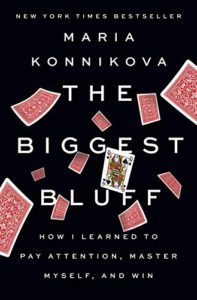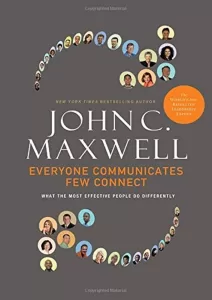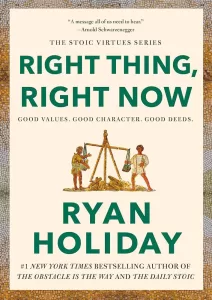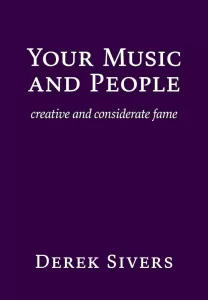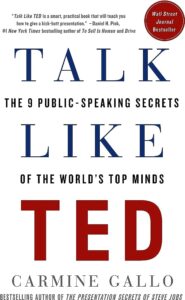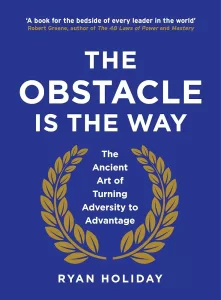Book Review: “The Biggest Bluff”
Book: The Biggest Bluff by Maria Konnikova
Reviewer: Bobby Powers
My Thoughts: 8 of 10
Journalist Maria Konnikova wanted to learn more about the flaws in her own decision-making, so she decided to spend one year learning how to play poker. She recruited one of the best players of all time as her coach: Erik Seidel. "It was supposed to be a year," says Konnikova. "It became a new life. From novice, I turned champion. From amateur, I went pro." Konnikova's journey is not only awe-inspiring, it is a fascinating view into the strange world of professional poker and the even stranger landscape of the human mind. I blew through this gripping and thought-provoking book.
What I Learned from the Book
The poker tables of Vegas, Monte Carlo, and Macau are a real-world, money-on-the-line laboratory ripe for insights about human psychology and decision-making. Whether we're playing poker or making life and career decisions, we tend to fall prey to the same irrational mistakes. They go by different names in different arenas--tilt, throwing good money after bad, the sunk cost fallacy, etc.--but if we put in the effort to understand WHY we're making specific decisions, we can systematically shape and improve our lives and our careers.
Selected Quotes and Ideas from the Book
Our Brains Deceive Us
- "[A] basic shortcoming of our neural wiring is that we can't quite grasp probabilities. Statistics are completely counterintuitive: our brains are simply not cut out, evolutionarily, to understand that inherent uncertainty."
- "In study after study, people fail to internalize numeric rules, making decisions based on things like 'gut feeling' and 'intuition' and 'what feels right' rather than based on the data they are shown. We need to train ourselves to see the world in a probabilistic light--and even then, we often ignore the numbers in favor of our own experience. We believe what we want to see, not what research shows."
- "Our experiences trump everything else, but mostly, those experiences are incredibly skewed: they teach us, but they don't teach us well. It's why disentangling chance from skill is so difficult in everyday decisions: it's a statistical undertaking, and one we are not normally equipped to deal with. Which brings me to poker: Used in the right way, experience can be a powerful ally in helping to understand probabilistic scenarios."
- "Our discomfort stems from the law of small numbers: we think small samples should mirror large ones, but they don't, really."
Poker and Life
- "But for its costliness and dangers, no better education for life among men could be devised than the gambling table--especially the poker table." -Clemens France
- "We judge the poker player for gambling; we respect the stockbroker for doing the same thing with far less information."
- "Poker is such a powerful window into probabilistic thinking not in spite of, but because of, the betting involved: the betting in poker isn't incidental. It's integral to the learning process."
- "[B]etting on uncertainty is one of the best ways of understanding it."
- "The beauty of poker is generally, delusion is punished." -Erik Seidel
- "There's a false sense of security in passivity. You think that you can't get into too much trouble--but really, every passive decision leads to a slow but steady loss of chips...Who knows how many proverbial chips a default passivity has cost me throughout my life. How many times I've walked away from situations because of someone else's show of strength, when I really shouldn't have. How many times I've passively stayed in a situation, eventually letting it get the better of me, instead of actively taking control and turning things around. Hanging back only seems like an easy solution. In truth, it can be the seed of far bigger problems."
Luck vs. Skill
- "[W]e only notice [luck] when things don't go our way. We don't often question the role of chance in the moments it protects us from others and ourselves. When chance is on our side, we disregard it: it is invisible. But when it breaks against us, we wake to its power."
- "Some of us imbue probability with emotion. It becomes luck: chance that has suddenly acquired a valence, positive or negative, fortuitous or unfortunate."
- "[W]hen you're winning, it's just too easy not to stop and analyze your process. Why bother if things are going well? When it comes to learning, Triumph is the real foe; it's Disaster that's your teacher. It's Disaster that brings objectivity. It's Disaster that's the antidote to that greatest of delusions, overconfidence. And ultimately, both Triumph and Disaster are impostors. They are results that are subject to chance. One of them just happens to be a better teaching tool than the other."
- "How we frame something affects not just our thinking but our emotional state...The language we use becomes our mental habits--and our mental habits determine how we learn, how we grow, what we become...Our thinking about luck has real consequences in terms of our emotional well-being, our decisions, and the way we implicitly view the world and our role in it."
- "There is no such thing as objective reality. Every time we experience something, we interpret it for ourselves. How we phrase sentences--are we the one doing the acting or being acted upon?--can determine whether we have an internal or external locus of control, whether we're masters of our fates or peons of forces beyond us. Do we see ourselves as victims or victors?"
Uncertainty Is Good
- "If we imagine to ourselves that we have to stake the happiness of our whole life on the truth of any proposition, our judgment drops its air of triumph, we take the alarm, and discover the actual strength of our belief." -Immanuel Kant
- "Would you bet your entire net worth on an opinion that you've just spent hours confidently offering on social media, broaching no possibility of being mistaken? Would you bet your marriage? Your health? Even our deep convictions suddenly seem a lot less certain when put in that light."
- Statisticians like Nate Silver were lambasted by the press for forecasting the wrong winner of the 2016 presidential election. "But what exactly did Silver say? In his final poll, on November 8, 2016, he gave Clinton a 71 percent chance of winning--and Trump a 29 percent chance. Twenty-nine percent. That's a whole lot of percent. That's nearly a third. And yet most people saw the 71 and read it as certain. The complexity of the alternative is just too taxing to take into account every time we make a judgment. To the vast majority, 71 is synonymous with 100. Clinton is winning."
- "Less certainty. More inquiry." -Erik Seidel
Think you’d like this book?
Other books you may enjoy:
Thinking in Bets by Annie Duke
Farsighted by Steven Johnson
Other notable books by the author:
Mastermind: How to Think Like Sherlock Holmes
The Confidence Game: Why We Fall for It...Every Time
